|
|
|
Sort Order |
|
|
|
Items / Page
|
|
|
|
|
|
|
| Srl | Item |
| 1 |
ID:
076739
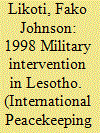

|
|
|
|
|
| Publication |
2007.
|
| Summary/Abstract |
The 1998 military intervention in Lesotho by South Africa and Botswana was shrouded in controversy. While South African officials claimed that the intervention was a Southern African Development Community (SADC) humanitarian peacekeeping mission to rescue Lesotho from a coup, the intervention appears to have been inconsistent with the UN Charter and with the SADC Treaty. Indeed, SADC had no role in legitimating this intervention because proposals relevant to coups had not been ratified by the SADC Summit. It would appear that the motivation for this intervention, at least on the part of South Africa, was to secure strategic resources, mainly water. National interest explains the intervention, rather than the rescue of a captive state as South Africa claimed.
|
|
|
|
|
|
|
|
|
|
|
|
|
|
|
|
| 2 |
ID:
062685
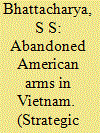

|
|
|
| 3 |
ID:
144327
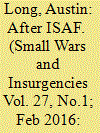

|
|
|
|
|
| Summary/Abstract |
The conclusion of the International Security Assistance Force (ISAF) mission in Afghanistan at the end of 2014 has generated substantial uncertainty about the duration and level of international commitment to Afghanistan. The fate of local allies of international forces is therefore deeply in doubt. This article is of necessity speculative rather than empirical, but it attempts to draw on the history of previous intervention in Afghanistan as well as more general patterns of local and external alliance to sketch plausible scenarios for the fate of local allies. It proceeds in four parts. First, it draws distinctions between different types of local allies in Afghanistan based on position and relationship to the Afghan state and an external actor. Second, it examines the Soviet withdrawal from Afghanistan for relevant lessons for the fate of local allies. Third, it presents a scenario based on the foregoing that assumes there will be an ongoing small but significant international military presence and accompanying resources. Fourth, it presents a scenario that assumes there will be no or minimal international military presence and accompanying resources.
|
|
|
|
|
|
|
|
|
|
|
|
|
|
|
|
| 4 |
ID:
106607
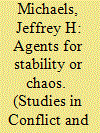

|
|
|
|
|
| Publication |
2011.
|
| Summary/Abstract |
Recent discussions among U.S. officials about how the intelligence community can demonstrate its "relevance" to counterinsurgency have been dominated by an ideology that presupposes large-scale military intervention, and in which the role of intelligence is limited to improving analysis in support of current military activities, with little debate of future requirements. This article will highlight a number of alternative conceptions of intelligence "relevance" to counterinsurgency, based on a study of several historical and contemporary U.S. and non-U.S. cases, and by applying a wider definition of counterinsurgency that includes cases where the military plays a subordinate role relative to the intelligence services.
|
|
|
|
|
|
|
|
|
|
|
|
|
|
|
|
| 5 |
ID:
068266
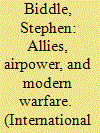

|
|
|
| 6 |
ID:
077361
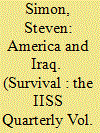

|
|
|
| 7 |
ID:
130871
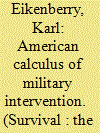

|
|
|
|
|
| Publication |
2014.
|
| Summary/Abstract |
The protracted campaigns in Afghanistan and Iraq have diminished America's appetite for waging wars to end tyranny or internal disorder in foreign lands. Military interventions have traditionally been a source of controversy in the United States. But America's appetite for the dispatch of armed forces has been diminished greatly by factors that have primarily emerged in the twenty-first century. These include, most painfully, the protracted campaigns in Afghanistan and Iraq that have made US political and military leaders more cautious about waging wars to end tyranny or internal disorder in foreign lands.
|
|
|
|
|
|
|
|
|
|
|
|
|
|
|
|
| 8 |
ID:
052469
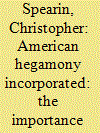

|
|
|
|
|
| Publication |
Dec 2003.
|
| Summary/Abstract |
The article contends that private military contractors supporting American military operations in Iraq will come under intense international scrutiny. Various factors have led to the substantial private presence and the Iraq case reveals shifts in international dynamics from state to private actors. However, the private presence raises concerns that will have to be considered due to the fishbowl qualities of the Iraq case. How the state-contractor relationship is managed will likely have a significant impact upon American policy in Iraq and upon how American military might is perceived, produced, and applied in the future.
Indeed, there are many problems and it is not entirely clear that the United States is prepared to handle the effects stemming from its heavy reliance upon military contractors.
|
|
|
|
|
|
|
|
|
|
|
|
|
|
|
|
| 9 |
ID:
062998
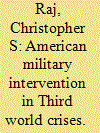

|
|
|
| 10 |
ID:
079993
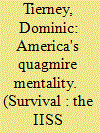

|
|
|
| 11 |
ID:
062050
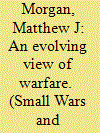

|
|
|
| 12 |
ID:
157903
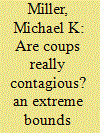

|
|
|
|
|
| Summary/Abstract |
Protests and democratic transitions tend to spread cross-nationally. Is this true of all political events? We argue that the mechanisms underlying the diffusion of mass-participation events are unlikely to support the spread of elite-led violence, particularly coups. Further, past findings of coup contagion employed empirical techniques unable to distinguish clustering, common shocks, and actual diffusion. To investigate which events diffuse and where, we combine modern spatial dependence models with extreme bounds analysis (EBA). EBA allows for numerous modeling alternatives, including diffusion timing and the controls, and calculates the distribution of estimates across all combinations of these choices. We also examine various diffusion pathways, such as contagion among trade partners. Results from nearly 1.2 million models clearly undercut coup contagion. In comparison, we confirm that more mass-driven political events robustly spread cross-nationally. Our findings contribute to studies of political conflict and contagion, while introducing EBA as an effective tool for diffusion scholars.
|
|
|
|
|
|
|
|
|
|
|
|
|
|
|
|
| 13 |
ID:
180200
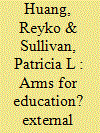

|
|
|
|
|
| Summary/Abstract |
How does foreign support for rebel groups affect rebel governance of civilians during armed conflict? Existing studies primarily examine the local and domestic politics of rebel rule, leaving the effects of foreign intervention on rebel governance underexplored. Focusing on rebel provision of social services, this study considers two competing arguments. The first suggests that foreign sponsorship reduces rebels’ need to rely on local civilians for resources and hence decreases rebels’ incentives to provide services. The second anticipates that by augmenting rebels’ resources and military capabilities, foreign support increases their capacity to provide welfare services. These competing logics suggest that different types of foreign support have divergent effects on rebel social service provision. The article tests this theory using cross-sectional time-series data on external support for rebel groups and rebel governance for the post-1945 period. It finds that rebel groups that receive external funding, weapons or training are significantly more likely to provide education and health services to civilians. In contrast, direct military intervention to assist insurgent forces has no effect on rebel service provision. This article is among the first to systematically study the impact of external support and third-party intervention on rebel social service provision during civil war and holds implications for civilian welfare in contested territories.
|
|
|
|
|
|
|
|
|
|
|
|
|
|
|
|
| 14 |
ID:
126413
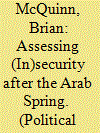

|
|
|
|
|
| Publication |
2013.
|
| Summary/Abstract |
The struggle to shape the narrative of Libya's postwar transition is being fought more intensely outside of the country than within it. The legitimacy of the military intervention in Libya by the West, supported by Qatar and the United Arab Emirates (UAE), has become tied to the perceived success or failure of the transition process: A positive outcome (i.e., the installation of liberal democracy) would legitimize NATO's intervention and, with it, the merits of interventionist military doctrines more broadly; a failure chastens such a policy. Putting aside questions about whether the legitimacy of the intervention should be primarily judged by the outcome of the transition, the practical consequence of this ulterior motive for judging the success or failure of the transition has warped international coverage of Libya. It has created incentives for observers to cherry-pick their portrayal of events so that they can present unambiguous conclusions about the progress of reforms and the transition in general (Rubin 2013; Wagner and Cafiero 2013). This myopia is unhelpful; it distorts international policy on Libya and results in scant analysis of the underlying (and often antithetic) social, political, or security dynamics shaping the transition. To remedy this, the following analysis examines the micropolitics of violence undergirding Libya's transition. As its basis John Gledhill's tripartite framework is used for understanding the causal pathways to collective violence during political transition (see "Editor's Introduction"). The contributions on Yemen and Egypt, which follow this article, also adopt Gledhill's framework, permitting comparison among these cases.
|
|
|
|
|
|
|
|
|
|
|
|
|
|
|
|
| 15 |
ID:
128999
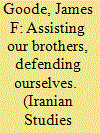

|
|
|
|
|
| Publication |
2014.
|
| Summary/Abstract |
The Iranian military intervention in Oman (1972-75) proved to be one of Shah Mohammad Reza Pahlavi's most successful foreign policy initiatives. He entered at the request of Sultan Qabus to help quell the Marxist rebellion of the Popular Front for the Liberation of Oman in Dhufar province. The shah took this action without any prior consultation with either Britain or the United States, acting for reasons wholly related to Iran's regional security. In so doing, he angered most of his Arab neighbors, who protested vigorously. He persisted. His troops tipped the balance in favor of the sultan's forces, contributing to a speedy end to the insurrection, for which Iran earned the lasting gratitude of the sultan.
|
|
|
|
|
|
|
|
|
|
|
|
|
|
|
|
| 16 |
ID:
011442
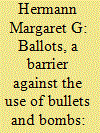

|
|
|
|
|
| Publication |
Sept 1996.
|
| Description |
436-459
|
|
|
|
|
|
|
|
|
|
|
|
|
|
|
|
| 17 |
ID:
133937
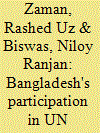

|
|
|
|
|
| Publication |
2014.
|
| Summary/Abstract |
This article argues that the participation of the Bangladeshi armed forces in UN peacekeeping has produced positive benefits for civil-military relations in the country and that this process is best explained by reference to concordance theory, as propagated by Rebecca Schiff. Unlike traditional theories of civil-military relations, concordance theory highlights dialogue, accommodation and shared values or objectives held by the military, the political elites and society. We argue in this paper that peacekeeping has gradually emerged in Bangladesh as an issue where all three partners are converging and prone to hold similar views. This may have a profound impact upon Bangladeshi politics whereby the chances of military intervention in domestic politics will lessen. This paper helps in understanding the implications of Bangladesh's involvement in UN peace missions, an issue on which little work has been conducted until now despite the fact that it has important implications for both the Bangladesh state and its armed forces.
|
|
|
|
|
|
|
|
|
|
|
|
|
|
|
|
| 18 |
ID:
157608
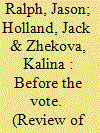

|
|
|
|
|
| Summary/Abstract |
The literature of recent UK policy toward Syria focuses on the 2013 chemical weapons crisis. We examine policy discourses leading up to that. The government supported the removal of Assad but faced the challenge of explaining how that would be realised. Given its unwillingness and inability to mobilise support for military intervention, or to tailor policy goals to match available means, government strategy arguably lacked credibility. Our purpose is to examine how the government tried to close this ends means gap and how, having failed to do that, its ‘discursive strategy’ legitimised its approach. We argue the resources for the government’s discursive strategy on Syria can be found in the earlier articulation of ‘liberal conservatism’. A policy that from an ideal-liberal or ideal-conservative position might have been criticised as half-baked was maintained by a strategy that gave consideration to, but did not completely follow through on, either archetype. Drawing on an analysis of 2,152 sources and supplemented by elite interviews, we illustrate how this strategy managed the interplay of two basic discourses: a liberal insistence that the UK should support ‘the Arab Spring’ and a conservative insistence that military intervention was imprudent because ‘Syria was not Libya’.
|
|
|
|
|
|
|
|
|
|
|
|
|
|
|
|
| 19 |
ID:
142492


|
|
|
|
|
| Summary/Abstract |
In 2006, the Mexican government launched an aggressive campaign to weaken drug-trafficking organizations (DTOs). The security policies differed significantly from those of previous administrations in the use of a leadership strategy (the targeting for arrest of the highest levels or core leadership of criminal networks). While these strategies can play an important role in disrupting the targeted criminal organization, they can also have unintended consequences, increasing inter-cartel and intra-cartel fighting and fragmenting criminal organizations. What impact do captures of senior drug cartel members have on the dynamics of drug-related violence? Does it matter if governments target drug kingpins versus lower-ranked lieutenants? We analyze whether the captures or killings of kingpins and lieutenants have increased drug-related violence and whether the violence spills over spatially. To estimate effects that are credibly causal, we use different empirical strategies that combine difference-in-differences and synthetic control group methods. We find evidence that captures or killings of drug cartel leaders have exacerbating effects not only on DTO-related violence but also on homicides that affect the general population. Captures or killings of lieutenants, for their part, only seem to exacerbate violence in “strategic places” or municipalities located in the transportation network. While most of the effects on DTO-related violence are found in the first six months after a leader’s removal, effects on homicides affecting the rest of the population are more enduring, suggesting different mechanisms through which leadership neutralizations breed violence.
|
|
|
|
|
|
|
|
|
|
|
|
|
|
|
|
| 20 |
ID:
022178
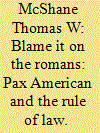

|
|
|
|
|
| Publication |
Summer 2002.
|
| Description |
57-72
|
|
|
|
|
|
|
|
|
|
|
|
|
|
|
|
|
|
|
|
|